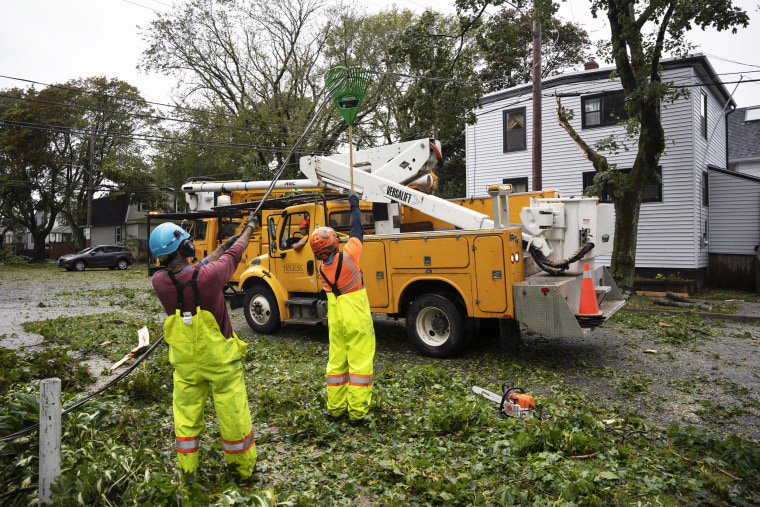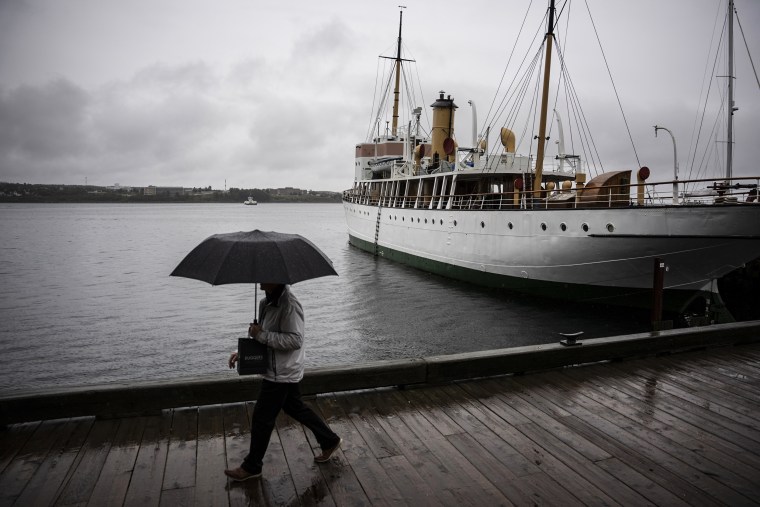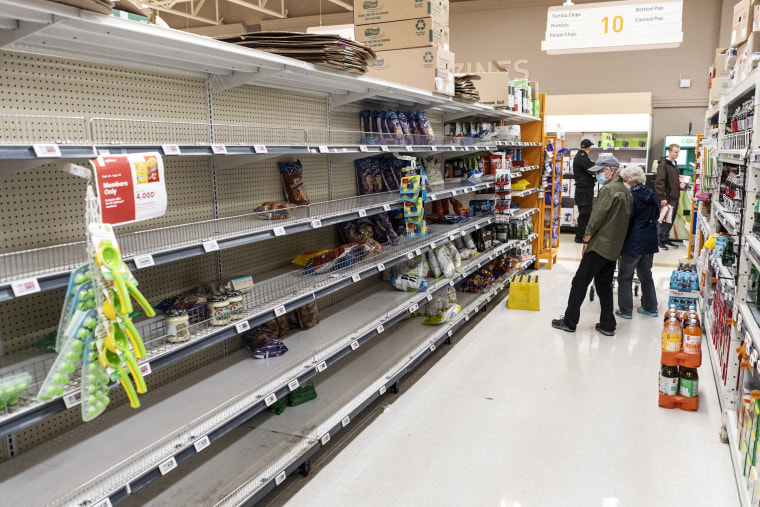Powerful storm Fiona knocked out power to more than 500,000 customers in Atlantic Canada Saturday, damaging homes with hurricane-force winds and heavy rain as it made landfall as a big, powerful post-tropical cyclone.
The U.S. National Hurricane Center said the center of the storm, now called Post-Tropical Cyclone Fiona, was crossing eastern Nova Scotia and as of 5 a.m. the storm was about 160 miles northeast of Halifax.
More than 415,000 Nova Scotia Power customers — about 80% of the province of almost 1 million — were affected by outages Saturday morning. Over 82,000 customers in the province of Prince Edward Island were also without power, while NB Power in New Brunswick reported 44,329 were without electricity.
Although the storm had weakened somewhat as it travelled north, the NHC said it was carrying maximum winds of 90 miles per hour and barrelling north at around 26 mph.

Experts predicted high winds, storm surges and heavy rainfall from Fiona, although a gradual weakening was forecast during the next couple of days, the storm was expected to maintain hurricane-force winds until Saturday afternoon, the NHC said.
“On the forecast track, the center of Fiona will move across eastern Nova Scotia and into the Gulf of St. Lawrence this morning, and then move across Labrador and over the Labrador Sea on Sunday,” the NHC said in a bulletin.
“It is going to be certainly a historic extreme event for Eastern Canada,” Bob Robichaud, a meteorologist with the Canadian Hurricane Centre, said at a briefing Friday.
Evacuation centers were opened in Halifax, Nova Scotia’s largest city, and more than 800 utility workers were in place across the province.
Officials on Cape Breton island said in a tweet that a state of emergency had been declared “amid widespread power outage, road closures, displaced residents and structural damage.”
Authorities on nearby Prince Edward Island also warned of a potentially historic storm surge as high as 8 feet.
Fiona approached Bermuda on Friday as a Category 4 hurricane. The storm weakened to a Category 3 and lashed the island with heavy rain and gusts of 100 mph as it passed, officials said. No deaths were reported there.
The storm had previously caused major destruction in Puerto Rico and the Dominican Republic. It made landfall as a Category 1 storm.
In Canada, officials have warned of possible prolonged power outages and have urged residents to be prepared.
Hurricane warnings stretched from Nova Scotia from Hubbards, which is west of Halifax, to the east, according to the National Hurricane Center in the United States.

Prince Edward Island, Isle-de-la-Madeleine, and western Newfoundland and Labrador were also under hurricane warnings, the U.S. agency said. Tropical storm warnings covered other areas.
Canadian Prime Minister Justin Trudeau said his thoughts were with the people of Puerto Rico and the Dominican Republic, and he urged Canadians to be prepared.
“It’s going to be a bad one,” Trudeau said Friday at an appearance with South Korean President Yoon Suk-yeol. “The federal government, as we always are, will be there with supports and resources as necessary — of course, we hope they won’t be much needed, but we feel they probably will be.”

The Royal Canadian Mounted Police urged people to stay off roads and to avoid unnecessary travel until the storm passed. Emergency officials on Nova Scotia, anticipating outages, warned residents about the lethal dangers of carbon monoxide from generators if used indoors.
In Petit-de-Grat on Cape Breton Island, Jordan David was helping his friend Kyle Boudreau tie down Boudreau’s lobster boat “Bad Influence” in hopes it wouldn’t be lifted and broken by winds.
“All we can do is hope for the best and prepare as best we can. There’s something coming, and just how bad is yet to be determined,” David told The Associated Press.
Puerto Rico saw an island-wide power outage as Fiona approached the island Sunday, and many remained without electricity Friday, five days later.
Eight deaths are suspected of being related to the storm there, officials have said. Two deaths in Dominican Republic, which involved a tree falling on a man and a woman who died in a motorcycle crash, was confirmed related to the storm by emergency officials there.
Canada has been struck by powerful storms that began as hurricanes before, including three years ago.
In 2019, Hurricane Dorian struck Nova Scotia as a strong post-tropical cyclone and knocked out power to 412,000 customers. Damage in Nova Scotia was estimated at almost $102 million, the CBC reported.
In 2003 Canada was hit by Hurricane Juan, a Category 2 storm at landfall that ripped through Nova Scotia. Eight people died in the storm or its aftermath there, according to Canada’s weather service.
That storm caused so much damage that the World Meteorological Organization retired the name Juan from its list of hurricane names, at Canada’s request.
